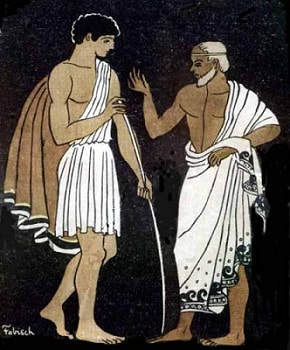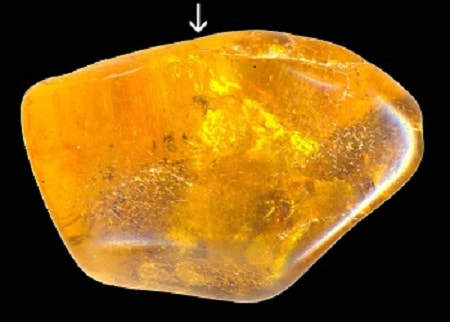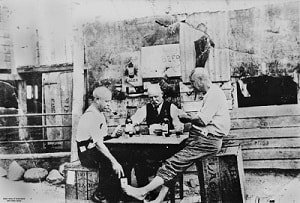David Tickner's Blog, page 43
August 21, 2020
Crowbar
 Two crows walk into a bar.
Two crows walk into a bar.After a few drinks, one of them says to the other, “It’s so noisy in here I can hardly hear myself caw.”
The other crow says, “Yeah, it’s murder in here. Let’s go.”
-o-
Anyway, what do crows have to do with crowbars? Not much, as it turns out.
The word crowbar is from 1748. Around 1400, the tool was simply called a crow, perhaps from its ‘beak’ or a loose resemblance to a crow’s foot. This seems like a stretch to me. The more plausible suggestion is that it comes from Old French cros or croc meaning a hook.
A crowbar is one of the few heavy-duty tools I know of that is made from just one part—a bar of steel. I think of how many hands over the centuries have shaped this bar of steel into what it is today. How many iterations have there been before workers said, “Yup, that’s it.”
Thanks to Lorna Crozier for the opening line of the joke.
Lorna Crozier. (2012). The book of marvels. Vancouver: Greystone, 29.
Reference: Online Etymological Dictionary, https://www.etymonline.com/
Published on August 21, 2020 17:43
August 20, 2020
Semester
 The word semester, from 1827, comes from German Semester, meaning a half-year or six-month course at a university.
The word semester, from 1827, comes from German Semester, meaning a half-year or six-month course at a university.The word semester has its origins in Latin mensis (month) which in turn comes from Proto-Indo-European (PIE) me(n)ses (moon, month).
So, what is six months in Latin? Latin sex (six) + mensis = semenstris, semestris (of six months, lasting six months, half-yearly, semi-annual). In other words, semester.
Reference: Online Etymological Dictionary, https://www.etymonline.com/
Published on August 20, 2020 21:15
August 19, 2020
Mentor
 THE STORY OF MENTOR
THE STORY OF MENTORHave you ever been mentored? Are you a mentor? Here’s a story about the origin of the word.
Once upon a time there was a king who sailed away with his army to fight in a foreign war leaving his wife and son at home to keep order in the kingdom. During the many years he was away, his wife was plagued by numerous suitors who believed that the king would never return. They conspired and competed amongst themselves to marry her and take over the kingdom. But his clever wife never succumbed to their wiles. She trusted that the king would return.
No one knew where the king was or if he was even still alive. His son, Telemachus, a young man full of vim and vigor but more than a bit idealistic and naïve, became increasingly angry at both his mother for tolerating these suitors and at his father for his absence.
Telemachus had a tutor named Mentor. We do not know much more about Mentor from this story other than that he was a wise old man, and a loyal friend of the king and his family.
One day Telemachus met an old sailor on the beach who suggested that Telemachus take one of his father’s ships and go with some of his friends over to the next kingdom, find some of his father’s friends, join forces, and try and track down his father.
But: here’s the twist in the story. The old sailor was the goddess Athena in disguise. Also, Athena knew that Telemachus would need guidance on his journey so she (as one version of the story says) “put on the appearance of the sage Mentor [and] guided young Telemachus during his efforts to find his father.” Athena was keeping an eye on Telemachus as a favour for her good friend, the king.
What I find fascinating and intriguing about this story is that the goddess Athena, no slouch in the self-esteem department, chose to disguise herself as Mentor in order to guide Telemachus. As told in Greek mythology, Athena, the daughter of Zeus and Metis, was born from the skull of her father, clad in full armour and shouting a war cry. She was considered the equal of her father in strength and wisdom. She was called the virgin goddess: “In all things,” she said, “my heart leans towards men, except in marriage.”
She was also called the warrior goddess, using strategy, ambush, cunning and magic to achieve her purposes. She was against excess in daily life, teaching men to conquer their savagery, tame nature, and master the elements. She was the patron of weavers, horsemen, blacksmiths, shipbuilders, foresters, and carpenters. She invented the chariot. The city of Athens is named after her.
So: why would Athena choose to disguise herself as an old man, as Mentor? Why not just send Mentor himself with Telemachus? Why are Mentor and Athena embodied in one person in this story? What is the ancient storyteller trying to tell us? What might this story tell us about mentor and mentoring? Any ideas?!
I’ll let you read the rest of the story for yourself. Sex and violence are involved.
The story, as you may know, is The Odyssey. Homer, who may have been one or several writers, composed two major works in the 8th century BCE—The Iliad and, its sequel, The Odyssey. The Iliad tells the story of the ancient Greeks and the Trojan War. One of the heroes of The Iliad is Odysseus (or Ulysses, as he is known in Latin), the king who is the father of Telemachus and the husband of clever and faithful Penelope. The Odyssey tells of Odysseus’s journey and eventual return home to his family after the war. I recommend the translations by Robert Fagles.
The etymology of mentor
The word mentor has its origins in the Proto-Indo-European root men (to think) which is the source of Sanskrit man-tar (one who thinks), Hindi mantra (a chanted hymn or prayer), Greek mentos (intent, purpose, spirit, passion), and the English word ‘mind’. The word mentor comes to English in 1750 from The Odyssey and means wise advisor, sage counsellor, and perhaps intimate friend. To be a mentor, that is ‘to mentor’ someone, is from 1888.
Mentor is also related to words such as monitor and Latin mandare (to command), the source of mandate, and mandarin (a high government official).
Reference: Online Etymological Dictionary, https://www.etymonline.com/
Published on August 19, 2020 23:08
August 16, 2020
Coach
The word coach has its origins in the Hungarian word kocsi (carriage; in particular, a large four-wheeled covered carriage), named for the village of Kocs where such coaches were first made in the 15th century. The word coach comes to English from Hungarian via 16th century French coche. The word coach was applied to railway passenger cars by 1866 and from 1949 the word was also used to mean economy or tourist class travel.
How did the word coach come to mean a word for instructor or trainer? In the 1830s, coach was a slang term at Oxford University for a private tutor who ‘carried’ a student through an exam. By 1849, the verb ‘to coach’ meant to tutor, to give private instruction to, and to prepare someone for an exam or contest.
The use of coach to describe a person employed to train athletes for a contest is from 1861.
In ancient Greece, home of the Olympics, an athletic trainer was an agonistarkhes (one who trains someone to compete in public games and contests). I guess if it hadn’t been for the Hungarians, today we would have heard benched players crying out, “Put me in, agonistarkhes, I’m ready to play!”
Online Etymological Dictionary, https://www.etymonline.com/
How did the word coach come to mean a word for instructor or trainer? In the 1830s, coach was a slang term at Oxford University for a private tutor who ‘carried’ a student through an exam. By 1849, the verb ‘to coach’ meant to tutor, to give private instruction to, and to prepare someone for an exam or contest.
The use of coach to describe a person employed to train athletes for a contest is from 1861.
In ancient Greece, home of the Olympics, an athletic trainer was an agonistarkhes (one who trains someone to compete in public games and contests). I guess if it hadn’t been for the Hungarians, today we would have heard benched players crying out, “Put me in, agonistarkhes, I’m ready to play!”
Online Etymological Dictionary, https://www.etymonline.com/
Published on August 16, 2020 20:02
Electrician
 When I was teaching, as part of the introductory activities on the first day of classes, I would ask participants about what they taught or about their work. If and when someone said that they were an electrician, I could respond by saying, “Did you know that the word electrician comes from an ancient word meaning petrified tree sap?”
When I was teaching, as part of the introductory activities on the first day of classes, I would ask participants about what they taught or about their work. If and when someone said that they were an electrician, I could respond by saying, “Did you know that the word electrician comes from an ancient word meaning petrified tree sap?”Yes, the ancient Greek word meaning petrified tree sap (amber) was elektron (in Latin, electrum). The Greeks noticed that when amber was rubbed with a cloth, small sparks could be produced. They also noticed that rubbed amber could attract other things to it. They called these sparks elektrons.
In the late 16th century, the English physicist William Gilbert (1540 – 1603) also noticed that amber exhibited this weak magnetic pull when charged with static electricity. In his treatise of 1600, De Magnete, he named this force electricus (from Latin, meaning ‘resembling amber’). By the 1640s, the terms electric and electricity were first used by an English physician Sir Thomas Browne.
At that time, the word electric described substances which, like amber, attracted other substances when rubbed. Later, in the 1670s, the term electric, meaning charged with electricity, referred to this physical force.
The word electrician, a scientist concerned with electricity, is from 1751. Electrician, meaning a technician concerned with electrical systems and appliances is from 1869. The phrase ‘electric light’ is from 1767, ‘electric blanket’ from 1930, ‘electric guitar’ from 1938, and ‘electric typewriter’ from 1958. The term ‘electric organ’ was coined in 1885 to name a hypothetical yet to be invented musical instrument!
Online Etymological Dictionary, https://www.etymonline.com/
Published on August 16, 2020 20:00
August 15, 2020
Conversation
Did you ever consider that having a conversation with someone may involve more than just talking?
You may be surprised (or not) to learn that the term ‘criminal conversation’ has been a legal term for adultery since the late 18th century. Before that, from at least the 14th century, the word conversation was a synonym for sexual intercourse.
I am reminded of a cartoon of an exasperated man trying to explain to his angry wife, “But she and I were just talking.”
How might the origins of the word conversation help us to understand this?
The word conversation has its origins in the Proto-Indo-European (PIE) root wer meaning to turn or to bend and Latin vertere (to turn). Latin con- (together, with) + vertere becomes conversare (to turn about, to turn about with) and conversari (to live, to dwell, live with, keep company with). Latin conversationem and conversatio mean frequent use, frequent abode in a place, intercourse, and conversation.
At this point, I have to admit that I turned to my dictionary for definitions of intercourse. Merriam-Webster (M-W) says that intercourse means: 1) connections or dealing between persons or groups, 2) exchange of thoughts or feelings (“See Communion”, M-W tells me), and 3) physical sexual contact. M-W also says that the word intercourse is from Latin intercursus (the act of running between) and intercurrere (to run between). [And, wouldn’t you know, currere is the source of the word curriculum! I can see another cartoon, this one for the scholarly journals: “But he and I were just working on our curriculum.” But I digress. Really digress.]
Back to the word conversation: From these Latin origins, the word conversacion comes to Old French, meaning behavior, life, way of life, monastic life… yes, monastic life (perhaps that’s another story for another time). By the 14th century the word conversation came to English meaning the place where one dwells or lives and, also, the general course of actions or habits, the manner of conducting oneself in the world. These meanings are now obsolete. Why? At this time, I don’t know.
Finally, it would seem that the use of the word conversation to mean talking together is relatively recent. Conversation, as the informal interchange of thoughts and sentiments by spoken words, is from the 1570s. The term ‘conversation piece’, meaning a subject for conversation, is from 1784.
In summary, in its origins, conversation describes people interacting with one another in different ways. Of the many words for interacting, many of which are now obsolete, the word talking is what has endured in terms of the current meaning and use of the word conversation.
Nevertheless, let us not forget that talking, ‘real’ talking, can be as intimate as touching.
Reference: Online Etymological Dictionary, https://www.etymonline.com/
You may be surprised (or not) to learn that the term ‘criminal conversation’ has been a legal term for adultery since the late 18th century. Before that, from at least the 14th century, the word conversation was a synonym for sexual intercourse.
I am reminded of a cartoon of an exasperated man trying to explain to his angry wife, “But she and I were just talking.”
How might the origins of the word conversation help us to understand this?
The word conversation has its origins in the Proto-Indo-European (PIE) root wer meaning to turn or to bend and Latin vertere (to turn). Latin con- (together, with) + vertere becomes conversare (to turn about, to turn about with) and conversari (to live, to dwell, live with, keep company with). Latin conversationem and conversatio mean frequent use, frequent abode in a place, intercourse, and conversation.
At this point, I have to admit that I turned to my dictionary for definitions of intercourse. Merriam-Webster (M-W) says that intercourse means: 1) connections or dealing between persons or groups, 2) exchange of thoughts or feelings (“See Communion”, M-W tells me), and 3) physical sexual contact. M-W also says that the word intercourse is from Latin intercursus (the act of running between) and intercurrere (to run between). [And, wouldn’t you know, currere is the source of the word curriculum! I can see another cartoon, this one for the scholarly journals: “But he and I were just working on our curriculum.” But I digress. Really digress.]
Back to the word conversation: From these Latin origins, the word conversacion comes to Old French, meaning behavior, life, way of life, monastic life… yes, monastic life (perhaps that’s another story for another time). By the 14th century the word conversation came to English meaning the place where one dwells or lives and, also, the general course of actions or habits, the manner of conducting oneself in the world. These meanings are now obsolete. Why? At this time, I don’t know.
Finally, it would seem that the use of the word conversation to mean talking together is relatively recent. Conversation, as the informal interchange of thoughts and sentiments by spoken words, is from the 1570s. The term ‘conversation piece’, meaning a subject for conversation, is from 1784.
In summary, in its origins, conversation describes people interacting with one another in different ways. Of the many words for interacting, many of which are now obsolete, the word talking is what has endured in terms of the current meaning and use of the word conversation.
Nevertheless, let us not forget that talking, ‘real’ talking, can be as intimate as touching.
Reference: Online Etymological Dictionary, https://www.etymonline.com/
Published on August 15, 2020 22:39
August 13, 2020
Sarcasm
Have you ever felt like tearing a strip off someone? Try sarcasm.
Sarcasm comes from Greek sarx (flesh) and sarkazein (to speak bitterly, sneer; literally, to strip off the flesh). Greek sarkazein is the source of Greek sarkasmos, Latin sarcasmus, and by the 1570s, the English word sarcasmus (a sneer, jest, taunt, mockery) which by the 1610s was spelled sarcasm. Greek sarx is not only the root of sarcasm but also of sarcoma (fleshy substance; later, a tumor).
Reference: Online Etymological Dictionary, https://www.etymonline.com/
Sarcasm comes from Greek sarx (flesh) and sarkazein (to speak bitterly, sneer; literally, to strip off the flesh). Greek sarkazein is the source of Greek sarkasmos, Latin sarcasmus, and by the 1570s, the English word sarcasmus (a sneer, jest, taunt, mockery) which by the 1610s was spelled sarcasm. Greek sarx is not only the root of sarcasm but also of sarcoma (fleshy substance; later, a tumor).
Reference: Online Etymological Dictionary, https://www.etymonline.com/
Published on August 13, 2020 20:11
August 12, 2020
Doula
The word doula comes from the ancient Greek words doule (servant woman) and doulos (slave, servant). Before this, the origins are unknown; however, there is archeological evidence from prehistoric times (e.g., stone carvings, statues) of a companion providing support to a birthing mother.
The modern Greek word doule is the source of the English word doula, which by 1972, meant a woman trained to assist another woman during childbirth and to provide support to the family after the baby is born. A doula is not the same as a midwife and cannot provide medicinal or midwifery support to the mother.
Reference: Online Etymological Dictionary, https://www.etymonline.com/
https://en.wikipedia.org/wiki/Doula
The modern Greek word doule is the source of the English word doula, which by 1972, meant a woman trained to assist another woman during childbirth and to provide support to the family after the baby is born. A doula is not the same as a midwife and cannot provide medicinal or midwifery support to the mother.
Reference: Online Etymological Dictionary, https://www.etymonline.com/
https://en.wikipedia.org/wiki/Doula
Published on August 12, 2020 13:20
August 10, 2020
Rook, Rooked, Rookie
 Do you play cards? Have you even been conned or taken advantage of? Have you ever felt that you’ve been cheated or ‘rooked’?
Do you play cards? Have you even been conned or taken advantage of? Have you ever felt that you’ve been cheated or ‘rooked’?The word rook is known to have been used in a disparaging manner since around 1500; especially, from 1570 when the word was used describe someone who cheated at cards or dice. By the 1590s, ‘to rook’ meant to cheat. You may have heard the someone say, “He rooked me out of $50!” Other than this, the origins of the word rook are unknown.
This use of the word rook likely found its way into the slang of the British army. For example, in 1868, Rudyard Kipling published a book of poems (Barrack-Room Ballads) imitating the accents and vocabulary of the lower ranks of men in the British colonial army (Gunga Din is perhaps one of the better-known poems from this collection). Kipling used the term ‘raw recruit’ when talking of the newly arrived men from England who were joining the colonial regiments.
As these men were fairly gullible and often ill-educated they were easily taken advantage of by the more experienced men (think of hazing rituals and so on). These new men could easily be ‘rooked’. Perhaps this use of rook may be the origin of the word rookie—someone inexperienced or new to something.
The word rookie came into general use in American English during the Spanish-American War (1898). The Online Etymological Dictionary cites the following from The Midland Monthly magazine (December 1898):
“The rapid growth of a word from a single seed transplanted in a congenial soil is one of the curiosities of literature. Take a single instance. A few weeks ago there was not one American soldier in a thousand who knew there was such a word as ‘rookey’. To-day there are few soldiers and ex-soldiers who have not substituted it for ‘raw recruit’."
Consider another connection between rook and recruit. How do you pronounce recruit? “Ree-croot” or “rook-root”? Perhaps the latter pronunciation is where we might find a possible origin of the word rookie. A ‘rook-root’ could be easily shortened to ‘rookie’.
A rook as described above is not to be confused with the chess piece called a rook which takes its name from the Persian word rukh (chariot), a piece used in early versions of the game.
Reference: Online Etymological Dictionary, https://www.etymonline.com/
Published on August 10, 2020 20:31
August 8, 2020
Jazz
 The word jazz, meaning a style of music, has its origins in words related to energy and vitality, baseball, and sex.
The word jazz, meaning a style of music, has its origins in words related to energy and vitality, baseball, and sex.The word jazz, meaning lively or energetic, arrived in English in 1912 as part of California baseball writing. By 1915, the word jazz was being used to describe a new style of music being heard in Chicago.
But where does the word jazz come from? The origins are uncertain. The most common theory (Porter, 2018) suggests that the word comes from 19th century slang terms gism (1842), and later jasm (1860), both meaning energy, strength, vitality, spirit, especially in a woman. However, by the end of the 19th century gism not only meant vitality but also virility and was being used as a slang term for semen (1899).
In 1918, the word jazz was first seen as a slang term for the act of sex. However, Porter (2018) wants us to be clear that this sexual connotation is recent and not related to the first uses of the word which, as noted, are related to energy and vitality, strength and spirit. Even so, such words do have a lot to do with sexuality.
Reference: Online Etymological Dictionary, https://www.etymonline.com/
Lewis Porter, "Where Did 'Jazz,' the Word, Come From?" http://wbgo.org (Feb. 26, 2018).
Published on August 08, 2020 12:44



